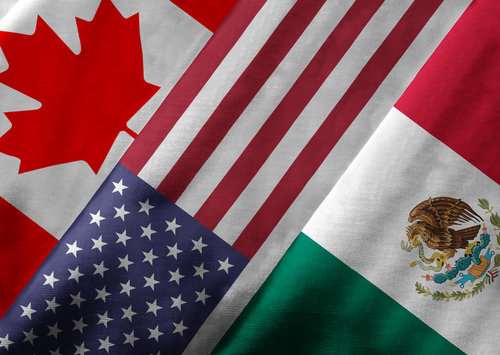The USTR would like to see NAFTA renegotiated in a number of specific areas – including agricultural goods.
Specifically, the agency wants to:
- “Maintain existing reciprocal duty-free market access for agricultural goods,
- “Expand competitive market opportunities for U.S. agricultural goods in NAFTA countries, substantially equivalent to the competitive opportunities afforded foreign exports into the U.S. market, by reducing or eliminating remaining tariffs,
- “Seek to eliminate non-tariff barriers to U.S. agricultural exports including discriminatory barriers, restrictive administration of tariff rate quotas, other unjustified measures that unfairly limit access to markets for U.S. goods, such as cross subsidization, price discrimination, and price undercutting,
- “Provide reasonable adjustment periods for U. S. import sensitive agricultural products, engaging in close consultation with Congress on such products before initiating tariff reduction negotiations, and
- “Promote greater regulatory compatibility to reduce burdens associated with unnecessary.”

Another NAFTA objective related to U.S. agriculture includes establishing a way to resolve “expeditiously unwarranted barriers that block the export of U.S. food and agricultural products.”
Farm groups weighs in
The American Farm Bureau Federation (AFBF) released a list of priorities it would like to see considered during NAFTA renegotiations.
The Farm Bureau’s goals include:
“U.S. agriculture depends upon a growing international economy that provides opportunities for farmers and ranchers to sell their products, and a modernized NAFTA will help expand those market opportunities for America’s farm and ranch businesses,” Jason Perdue, a producer from York, Nebraska, told the House Ways and Means Subcommittee on Trade on behalf of the AFBF today.
The U.S. dairy industry also outlined its priorities for NAFTA renegotiations.
When it comes trade with the country’s northern partner, U.S. dairy representatives want Canada to remove its “trade-distorting policies and (to open) a sheltered market.”
“NAFTA modernization discussions are an unmissable opportunity to address that type of unfinished business in order to truly open up the North American market and put our dairy exports to Canada on par with the vast majority of the rest of the U.S. economy,” Stan Ryan, president and CEO of Darigold in Seattle, told the House Ways and Means Subcommittee on Trade.
NAFTA negotiations are scheduled to begin August 16.